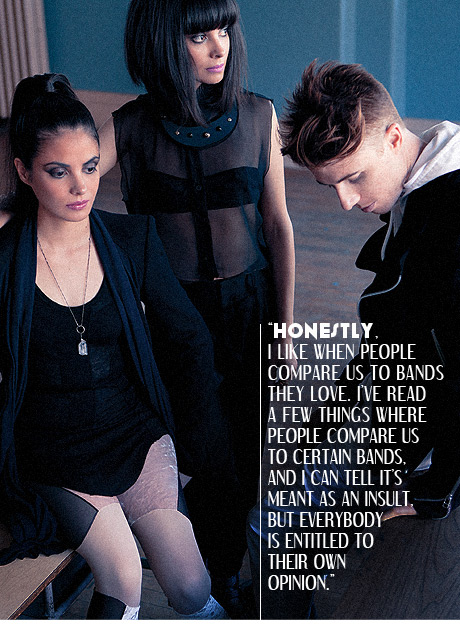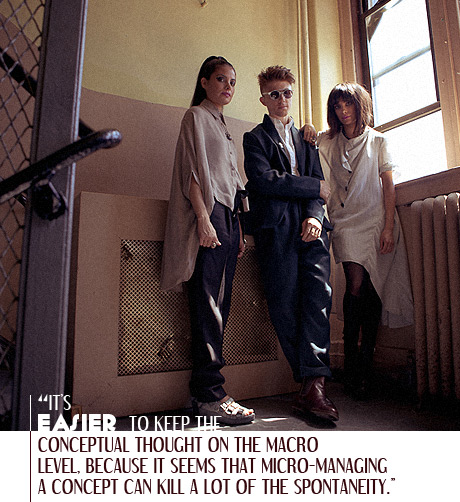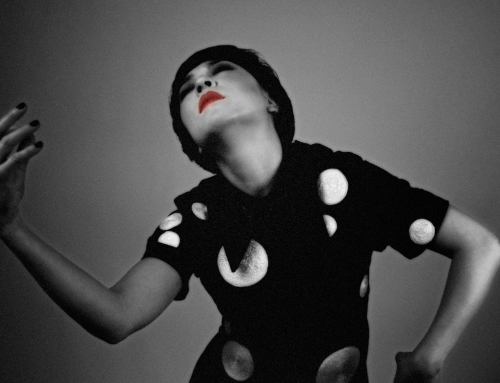After having fed my stereo Disconnect From Desire, the second album from Brooklyn trio School of Seven Bells (SVIIB), I imagined it sat content and smiling, fully supped on an attractively recorded album that while at times delicate, was clearly made to sound good and loud. It does.
SVIIB’s newest installment is a slight departure from 2008’s Alpinisms as the arrangements have grown more refined, but the dreamy tones and intriguing lyrics remain. When asked whether that’s a case of evolution or revolution the band looks at it both ways. “We definitely couldn’t have made it a year ago, so that’s a big evolution for us.” says Ben Curtis, the band’s guitarist. “On the other hand, a lot of the ways I’ve found to express the ideas in my head are revolutionary for me, personally”. Alejandra DeHaza, vocalista, adds, “It’s definitely more evolutionary. Our last record, Alpinisms, was the three of us figuring out what we sounded like when we mixed. We were still finding what we individually and collectively were good at.”
It’s no surprise that their chemistry has matured as Curtis and Alejandra shared a home and creative space with bandmate/vocalista Claudia DeHaza, Alejandra’s twin sister, while making the album. Says Curtis, “It was good to work on music so irregularly. We could jump into a song at any moment.” Perhaps as a result of this, the album is throbbing with potential energy, always sounding as if something bigger and louder is around every bend.
“Windstorm,” the opening track, thrives on tension, with the payoff coming in the form a swirling harmonic chant that truly sticks in the head. “I think we all have a huge love of harmony,” explains Curtis. “Overall, I don’t think we overly intellectualize it. It’s always about conveying emotion.”
The heart of the album takes on a decidedly dancy feel, led by “Babelonia,” which is a sort of concentration of the essence of Disconnect From Desire, as a decidedly rock-toned guitar pokes through the foggy build-up and ushers in the effortless vocal. However, the sameness of tempo in songs like “Heart Is Strange” and “Dust Devil” detracts from the effect of the hooks, sometimes letting a very catchy chorus slip through the tiny cracks. The group is at their best on the mellower tracks like the positively gorgeous “Dial,” with its perfect build up and careful arrangement, and “The Wait,” which cools down enough to let the truly interesting lyrics become the focus, providing a welcome change of scenery. “It seems a lot of people have been interested in the fact that the vocal writing and recording happens so early in the process,” says Curtis. “It seems easier for us to work from the top down every now and then.” This focus on the DeHaza sisters’ golden throats gives the album a cohesiveness, but Curtis stops short of calling it a theme. “Before we started the album, we knew what kind of record it was going to be. We even knew the title,” he says. “But from there, whatever came out is what became the record. It’s easier to keep the conceptual thought on the macro level, because it seems that micro-managing a concept can kill a lot of the spontaneity.” The hazy and dream-like sounds produce a cinematic feel. On whether or not they thought the record would match well with any movie (kind of like The Wall and The Wizard of Oz), Alejandra sees a Stanley Kubrick remake of Lost Boys: “Wow — that would have been the soundtrack of my dreams.” Ben opts for Wim Wenders: “I think Wings of Desire would be perfect.”
Rather impressively, Disconnect From Desire packs a lot of directions in a ten-song frame and at times these angles can argue or fall flat, leaving a song to struggle to find its identity, but in this day and age, having too many horses in the stable is a high-class problem, and this record is worth at least a ride.
…………………………………………………………………………….
Hair, Sarah Sibia (See Management)
Makeup, Nico Guilis (See Management)













